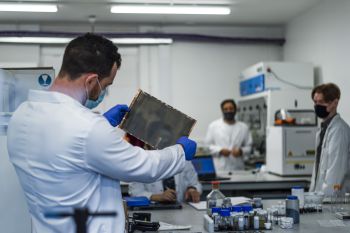
Research news
Advanced Material Development and University of Sussex agree new 10-year commercial partnership
Posted on behalf of: Lauren Ellis
Last updated: Monday, 12 August 2024

The University of Sussex and nanotechnology company Advanced Material Development Ltd (AMD) have this summer sealed a new 10-year strategic partnership, which will see the development and commercialisation of nanomaterial inks and coatings for both consumer and industry products.
Nanomaterials are the building blocks of materials and electronics, ten thousand times thinner than human hair. The coatings being developed at the University of Sussex have novel electrical, thermal or optical properties, enabling new designs of electric vehicles, wind turbines and ‘smart windows’, among other applications.
A leading developer of nanomaterial technology solutions, AMD aims to solve real-world industry challenges, working with institutions to develop new materials across a range of applications and sectors. Based on University background IP, their Chief Scientific Advisor is the University’s Professor Alan Dalton.
AMD’s 10-year partnership with University of Sussex includes investment worth £2.6 million over the first three years.
This initial funding will support Sussex researchers as they develop conductive inks for smart windows. The inks, which change transparency when responding to heat and light, could in future lead to smart windows being used to support sustainable building heat management, letting heat in from the outside when cold inside, or letting heat out when it is hot inside. With 80% of domestic energy consumption currently being used to heat spaces and water, technologies like this could change how we manage heat in our homes.
The Sussex team will also use the funding to help develop coatings to reduce electrical interference for electric vehicles (EVs) – currently a barrier in the design of EVs. Infrared materials and conductive inks will provide electromagnetic shielding for EVs, solving a real-world problem for manufacturers.
University of Sussex Vice Chancellor and President, Professor Sasha Roseneil says:
“This new partnership with AMD is enabling the University of Sussex to stretch our research capability in exciting new directions. Our scientists are carrying out world-leading research into nanomaterials that has enormous potential to bring out positive change, including supporting the fight against climate change, as well as contributing to innovation and growth that the UK economy needs”.
AMD and the University of Sussex have previously partnered on numerous technological initiatives including the development of electrically conductive inks to enable printed radio frequency identification tags (RFID) which are used on clothing and food for warehouse management and anti-theft. Billions of metal tags are used per year and almost all go to landfill. Sussex research into metal-free tags found a sustainable solution, printing on paper and making the product compostable.
The teams also work together to produce radar-absorbing materials for reducing ‘radar clutter’ on wind turbines, which prevents them from interfering with weather forecasting and defence systems.
AMD CEO, John Lee says:
“We have been working successfully with the Sussex team headed by leading material scientist and AMD’s Chief Scientific Advisor, Professor Alan Dalton to produce a phenomenal portfolio of intellectual property. We seek to apply this to substantial real-world challenges to deliver unique and novel solutions to our global customer base. I am delighted to be continuing this lucrative partnership with such a dedicated and talented team as well as extending our reach into other leading academic institutions internationally, particularly in the US.”
Customers who have purchased and benefited from the products developed by the partnership between AMD and Sussex, range from NASA and the UK and US government Defence agencies, to windfarm turbine manufacturers, automotive coatings manufacturers and life sciences companies, among many others.

